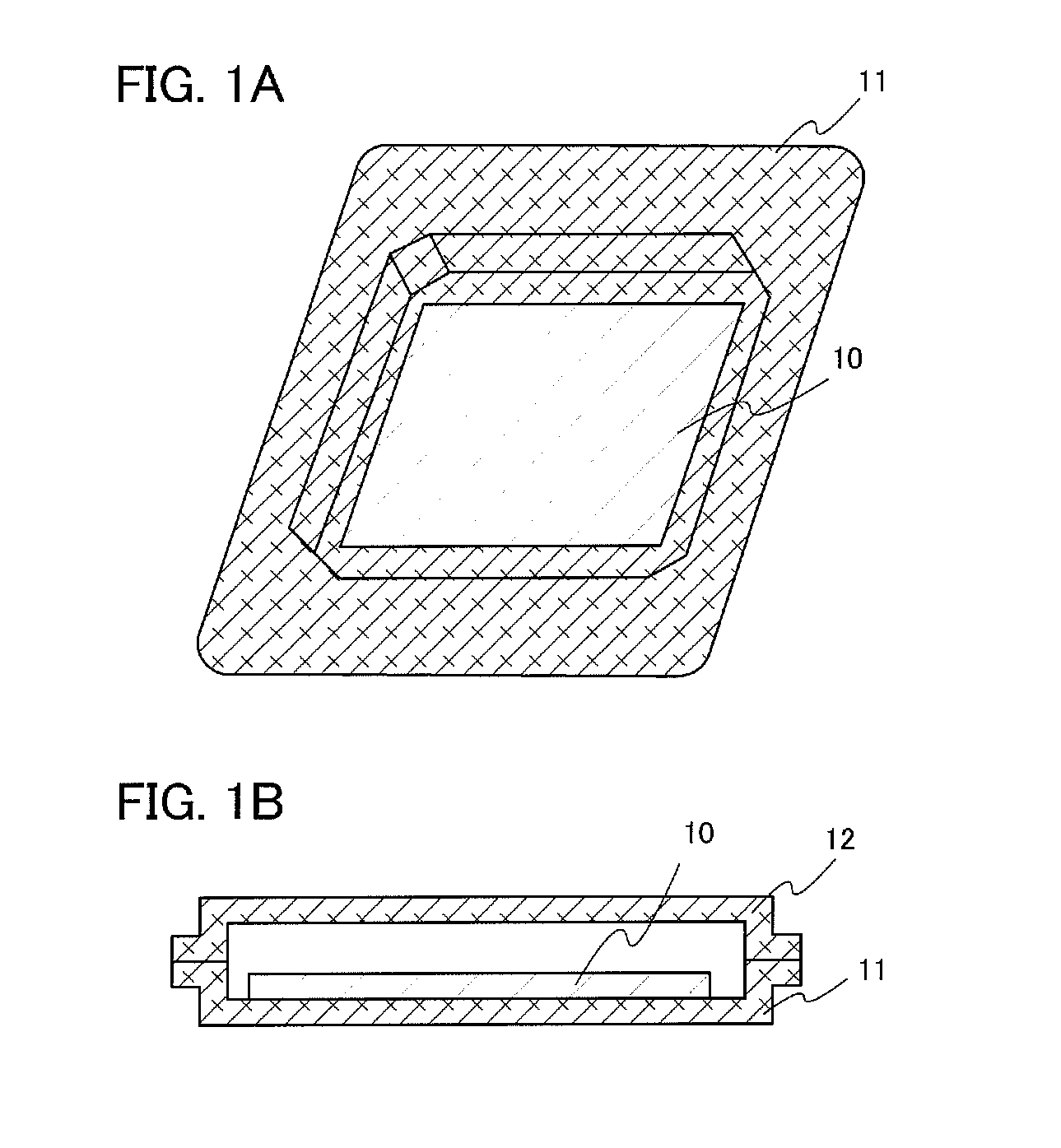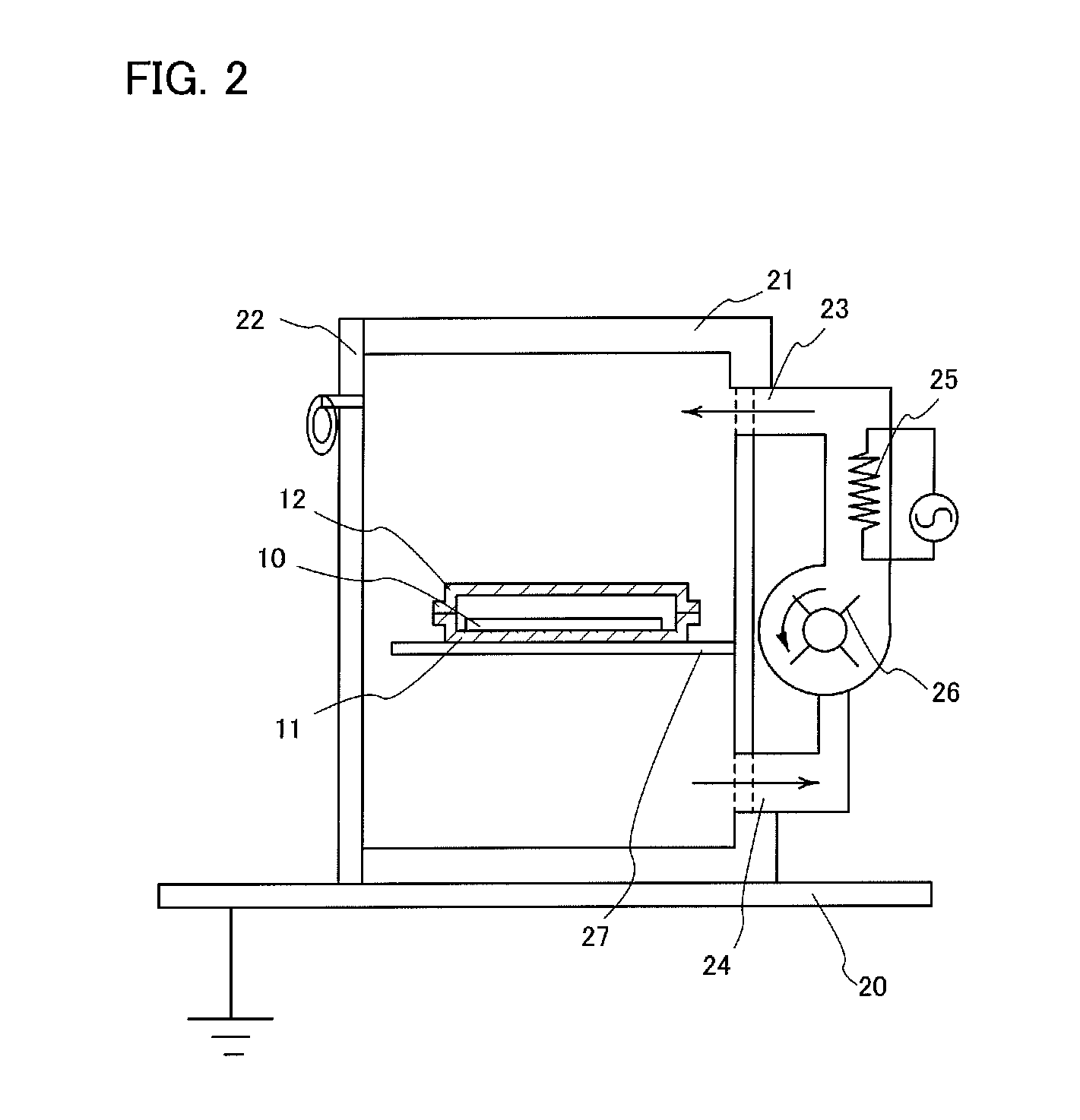Method for removing electricity and method for manufacturing semiconductor device
a technology of semiconductor devices and electricity removal, which is applied in the testing/measurement of individual semiconductor devices, semiconductor/solid-state devices, instruments, etc., can solve the problems of changing electrical characteristics or damage to circuits, dust can be easily attached to products, and the yield of manufacturing semiconductor devices can be improved, and the static electricity with which a substrate is charged in the manufacturing process of a semiconductor device can be favorably reduced.
- Summary
- Abstract
- Description
- Claims
- Application Information
AI Technical Summary
Benefits of technology
Problems solved by technology
Method used
Image
Examples
embodiment 1
[0055]In this embodiment, heat treatment with a substrate surrounded using a tray body and a tray cover will be described below.
[0056]FIG. 1A is an external view illustrating a state in which a substrate 10 is placed in a depressed portion of a tray body 11.
[0057]The substrate 10, for which a glass substrate or the like is used, is provided with a circuit including a thin film transistor on one side. Note that the shape of the substrate 10 is not particularly limited to a quadrangular shape and may be a circular shape or the like, for example.
[0058]The tray body 11 is formed using a conductive material such as aluminum, copper, titanium, molybdenum, tungsten, or niobium. In this embodiment, aluminum is used.
[0059]Then, a tray cover 12 is placed so as to overlap the tray body 11 such that the substrate 10 is surrounded as shown in a cross-sectional view of FIG. 1B. Then, the peripheral portion of the tray body 11 and the tray cover 12 is hermetically sealed with kapton tape or the li...
embodiment 2
[0120]In Embodiment 1, an example in which a tray with a cover is used as a storage container for a substrate is described; in this embodiment, a container having a quadrangular prism shape is used.
[0121]FIG. 6A is a schematic diagram illustrating a state shortly before a substrate 10 is put in a container 61 having a quadrangular prism shape. In this embodiment, the container 61 is illustrated as storing a substrate in a state where one substrate surface is directed vertical. Note that FIG. 6B is a top view of the container 61 in a state after the substrate 10 is stored therein, and a substrate holding member 62 is provided in contact with the substrate. For the container 61, a conductive material such as aluminum, copper, titanium, molybdenum, tungsten, or niobium is used. The substrate holding member 62 is also preferably formed using a conductive material.
[0122]Note that FIGS. 6A and 6B illustrate the container 61 which is configured to store only one substrate, whereas the cont...
embodiment 3
[0126]In Embodiments 1 and 2, examples of using containers are described; in this embodiment, metal foil is wrapped around a substrate, which is placed on the shelf of the heating apparatus in FIG. 2 and heated while being electrically connected to a ground potential.
[0127]FIG. 7A is an external view in which one substrate 10 is wrapped in metal foil 71. FIG. 7B is a cross-sectional view thereof.
[0128]As a material of the metal foil 71, aluminum, copper, titanium, molybdenum, tungsten, niobium, or the like is used. In this embodiment, aluminum foil is used.
[0129]A sheet of aluminum foil may be used to wrap the substrate 10, or a plurality of sheets, two or more sheets, of aluminum foil may be used to wrap the substrate 10. In addition, it is preferable that a substrate is put in a hollow space surrounded by aluminum foil, which is hermetically sealed with kapton tape or the like so as not to expose the substrate to ambient air.
[0130]A substrate wrapped in aluminum foil is placed on ...
PUM
 Login to View More
Login to View More Abstract
Description
Claims
Application Information
 Login to View More
Login to View More - R&D
- Intellectual Property
- Life Sciences
- Materials
- Tech Scout
- Unparalleled Data Quality
- Higher Quality Content
- 60% Fewer Hallucinations
Browse by: Latest US Patents, China's latest patents, Technical Efficacy Thesaurus, Application Domain, Technology Topic, Popular Technical Reports.
© 2025 PatSnap. All rights reserved.Legal|Privacy policy|Modern Slavery Act Transparency Statement|Sitemap|About US| Contact US: help@patsnap.com



